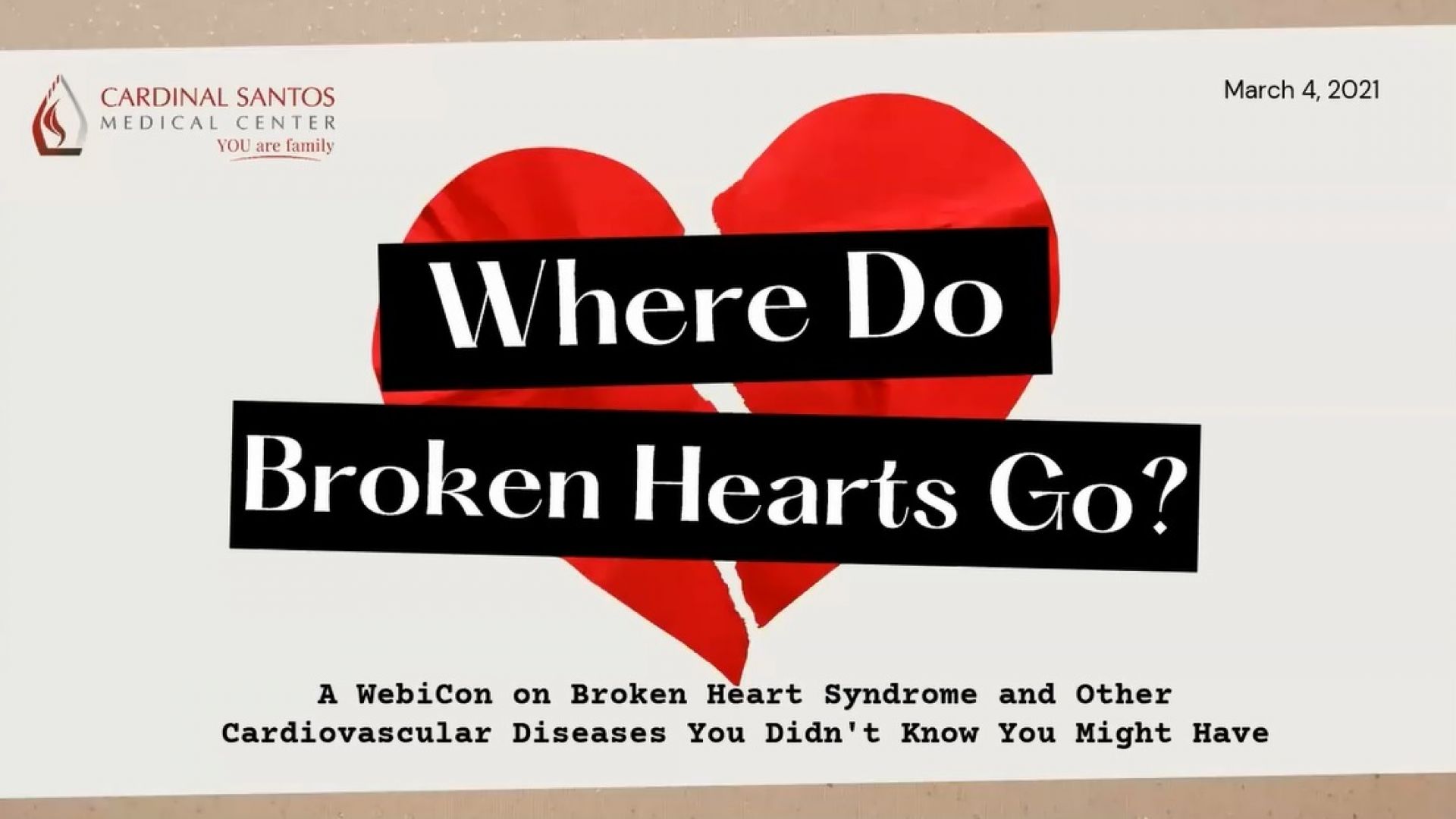Cardinal Santos Medical Center (CSMC) recently held a webicon with the aim of promoting increased awareness of cardiovascular diseases that are becoming more prevalent and encouraging regular heart check-ups among adults regardless of age. The online event was held last March 4, 2021 over Zoom.
Through the webicon, titled Where Do Broken Hearts Go?Broken Heart Syndrome and Other Cardiovascular Diseases You Didn’t Know You Might Have, CSMC cardiologists underscored the importance of knowing about the typical symptoms associated with the most common cardiovascular diseases, as well as how to address and prevent them. Cardinal Santos’ Cardiovascular Institute’sChairman Dr. Ariel Miranda, Critical Care and Heart Failure Unit Head Dr. Rucci Cruz, and Preventive Cardiology Head Dr. Lourdes Ella Santos joined the event as speakers, withthe Institute’s Executive Officer Dr. Regidor Encabo as moderator.
Dr. Encabo cited the long-running perception that cardiovascular diseases only occur among adults aged 60 above, which must now change as the number of young people developing these diseases has been on the rise in recent years. “That is why it is vital that people learn how to identify and manage heart disease risk factors,” Dr. Encabo said.
Dr. Santos talked about preventive cardiology with a focus on managing the associated risk factors, which fall under two classifications: non-modifiable risk factors, which are age, sex, and genetic disorders to name a few; and modifiable risk factors, which include smoking, sedentary lifestyle, diet, increased cholesterol levels, hypertension, inflammation, diabetes, and obesity, among others.
She said that there is nothing that can be done with the non-modifiable risk factors, so individuals must focus on managing the modifiable risk factors since these canalso contribute greatly to the development of cardiovascular diseases if left unchecked. This is where consulting with a preventive cardiologist comes in. “The role of a preventive cardiologist is to help individuals minimize these risk factors in order to prevent the occurrence of cardiovascular diseases,” Dr. Santos said.
“According to the American Heart Association and American College of Cardiology, a team-based care approach is an effective strategy for the prevention of cardiovascular disease, and this is one of the options being offered by the Preventive Cardiology Center of Cardinal Santos,” Dr. Santos added.
Meanwhile, Dr. Cruz talked about heart failure—what it is, how it occurs, what can cause it, and how it can be prevented. She began by naming the two types of heart failure. The first one is heart failure with reduced left ventricular function or reduced ejection fraction, which is whenthe heart is unable to pump out enough oxygen-rich blood that is needed by the rest of the body. The second type is heart failure with preserved left ventricular function or preserved ejection fraction, where contractility is normal, but the heart’s chambers get thicker, resulting in a fewer amount of blood going into the heart.
According to Dr. Cruz, the most common causes of heart failure include hypertension; coronary artery disease, which results from the buildup of cholesterol in the arteries; and faulty heart valves, which causes the heart to work harder in supplying blood to the body, just to name a few. Dr. Cruz said that the best way to prevent these is maintaining good physical and mental health, as well as minimizing stress levels. Regular visits to the doctor are also important in keeping heart failure at bay, she said.
“A heart failure diagnosis is usually made based on your medical history. If you think you have the symptoms, it is best to consult us and we will do the proper physical examination to find other signs of heart failure. And then after that, we will request for heart function tests,” Dr. Cruz said while talking about the services offered by CSMC in preventing heart failure.
Dr. Miranda discussed the various reasons why people don’t want to consult medical professionals when it comes to the treatment of cardiovascular diseases, and the biggest of these, according to a study conducted by CSMC, is the financial challenges involved when seeking treatment.
“One particular important thing why patients do not want to go to the hospital is because they know that they will spend a lot of money,” Dr. Miranda said. “A lot of Filipinos, it takes them a long time to decide. Even those who get admitted to the E.R. due to heart attack, they still can’t decide if they would want to undergo treatment, because they’re thinking of the expenses.”
He then hoped that stakeholders in the medical industry will be able to work together in creating coverage options that will help Filipinos with this problem when treating cardiovascular diseases. “We want it so that when a patient visits us, we can assure them that they are covered.”
For more information about Cardinal Santos, please visit https://cardinalsantos.com.ph/. Cardinal Santos is also on Facebook, like and follow them at www.facebook.com/CardinalSantos




